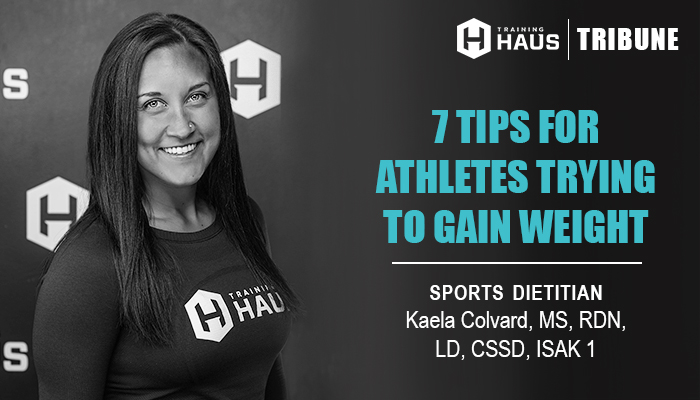
7 Tips for Athletes Trying to Gain Weight
As a competitive athlete and active individual, gaining weight can be a surprisingly harder task than it seems! One might think weight gain can be achieved by simply eating more, but there is far more to it when your goal is gaining functional muscle mass. While eating more is certainly an important aspect of weight gain, there are many factors to consider.
7 Tips
1. Utilize the off-season for weight gain efforts. The off-season is a great time to gradually increase weight in preparation for the season as weight gain is a HUGE commitment. Slow, trained growth (no more than 2 pounds per week) is key.
2. Eat every 2-3 hours. Eating more frequently will make increasing energy intake easier and allow your body to utilize and absorb a greater amount of protein. Remember to eat a pre-workout and post-workout snack to take advantage of the muscle protein synthesis window.
3. Don’t forget about carbohydrates. Too many people over do it on their protein intake, which makes them too full and does not help increase functional capacity of muscle. Carbohydrates fill your muscle with energy that translates to power, speed and explosiveness; focusing on increasing carbohydrates is absolutely key.
4. Commit to a bedtime snack. Studies have shown that consuming protein prior to sleep can increase muscle protein synthesis. Ideas of protein-rich snacks include: Greek yogurt with granola and berries, trail mix and milk, cheese with whole grain crackers and grapes, and the HAUS Built smoothie (recipe found at the end of the article).
5. Focus on energy density. Eating at an energy surplus can be tough on your body’s digestive system if food choices are not made efficiently. Increasing energy density of foods is one way to alleviate this stress. You can get the same energy in a regular bowl of oatmeal with peanut butter and a banana that you could get eating 15 rice cakes! Try choosing whole vs skim milk, avocado spread vs mustard, trail mix vs. crackers. Check out our HAUS Built smoothie recipe for an energy dense snack.
6. Be aware of appetite suppressants. Overconsuming protein/protein powders/protein shakes, appetite suppressive medications, alcohol, tobacco (chewing or smoking), stress (school, family, etc.), and over-training can all suppress the appetite and make it more difficult to gain weight.
7. Seek support from a Sports Dietitian. Weight gain is a very unique process per individual and the nutrition component is no different. Many people over-supplement with no results because there are significant gaps in their fueling foundation. Be strategic about your weight gain plan and educate yourself from a reliable source that understands the unique nutrition needs of an athlete to safely and effectively reach your goals.
Why do athletes struggle to gain weight?
When an athlete is constantly training, putting on weight can oftentimes be more difficult than losing it. First, exercise itself is an appetite suppressant. If you’ve ever noticed that you are not hungry after a long and intense practice, and the LAST thing you want to do is eat, it is because exercising naturally suppresses your appetite, diverting your blood flow from your digestive tract, often tricking your mind into thinking it is not hungry. During and immediately after intense exercise, your hunger hormones decrease while your fullness hormones increase. However, these hormonal fluctuations are typically short-lived, so it is important to still prioritize post-exercise recovery nutrition to maximize your recovery window and get the most out of each training session!
Secondly, athletes can struggle to gain weight because they often don’t realize that when they increase their training, they must also increase their energy intake. In addition to physical activity, normal growth and development burns calories, as does daily life stressors. In order to gain weight, the number of calories consumed must be greater than the number of calories burned. Over 82% of the athletes from high school to the Olympic level seeking nutrition support at the Training HAUS are actually under-fueling compared to over-fueling! Successful weight gain can be achieved when an athlete is taking in more energy than they are burning, and honing in on their nutrient timing.
Fueling to Promote Muscle Growth and Weight Gain
When focusing on functional muscle gain, it is more than just gaining weight for gaining weight’s sake! Strategic goal-setting in partnership with your sports performance training can allow real muscle to grow. When making an effort to gain weight for function, promoting muscle growth and strength is important in maintaining desired body composition without gaining excess body reserves (body fat). A variety of factors can play a role in weight gain: genetics, stage of development, training type, sleep, and nutrition. Focusing on energy intake, timing, and nutrient balance is critical for successful weight gain.
HAUS Built Smoothie Recipe
This is a great option for an athlete looking to gain weight. This smoothie is chock-full of muscle building protein, energizing carbohydrates, and healthful fats.
Ingredients
- Milk – 10 oz
- Greek Yogurt – ¼ cup
- Banana – ½ fruit
- Frozen Berries – ½ cup
- Protein powder* – 1 serving
- Peanut butter – 2 tbsp
- Oats – ¼ cup
- Avocado – ¼ fruit
- Spinach – ¼ cup
Place all ingredients in a blender, blending until all ingredients are combined. For a thicker smoothie, slowly add a few ice cubes at a time until you reach your desired consistency. For a thinner smoothie, slowly add more milk until desired texture is reached. Enjoy! *Discuss safe supplementation with a Registered Sports Dietitian
In Conclusion
If you’d like help with your weight gain goals, please call us today to schedule a nutrition consultation with one of our Sports Dietitians.
Sources
- Rebecca L. Carl, Miriam D. Johnson, Thomas J. Martin, COUNCIL ON SPORTS MEDICINE AND FITNESS. Pediatrics Sep 2017, 140 (3) e20171871; DOI: 10.1542/peds.2017-1871
- Dorling J, Broom DR, Burns SF, et al. Acute and Chronic Effects of Exercise on Appetite, Energy Intake, and Appetite-Related Hormones: The Modulating Effect of Adiposity, Sex, and Habitual Physical Activity. Nutrients. 2018;10(9):1140. Published 2018 Aug 22. doi:10.3390/nu10091140

